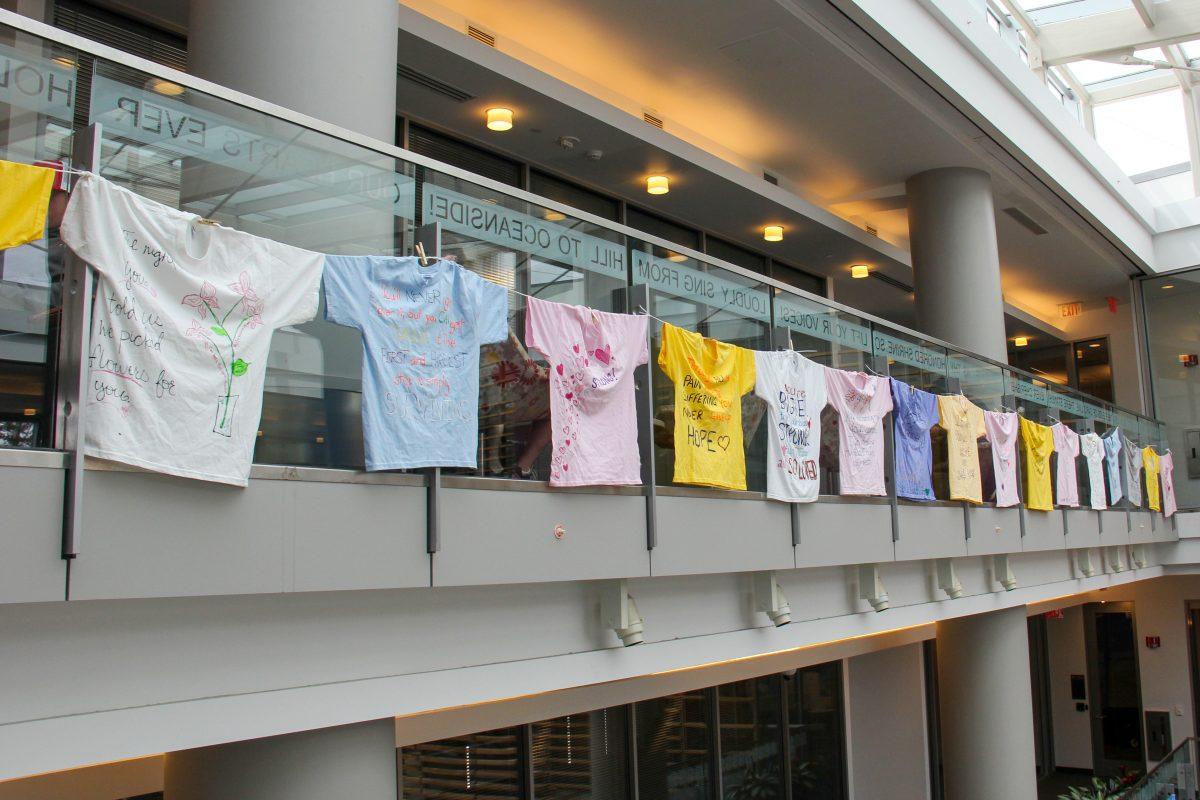Editor’s Note: This article contains reference to sexual assault and interpersonal violence.
For all of April, colorful shirts with personalized messages are on display in front of the student centers and hanging from the railings in Talley Student Union.
This display is a part of the Clothesline Project — a nationwide visual display created by a coalition of women’s groups in Massachusetts. Displaying shirts with messages from survivors, the project has been linked to Sexual Assault Awareness Month and has local iterations in cities and universities across the country.
Kaelie Giffel, assistant director for Interpersonal Violence Prevention at the Women’s Center, said NC State has been displaying the Clothesline Project in Talley for about a decade. The project is integrated as a part of Sexual Assault Awareness Month.
“We try to build as much community around this issue as we can,” Giffel said. “On the one hand, keeping face with the reality of the violence that is sexual assault, but on the other hand, trying to provide something positive, which is that we are more than the violence that happens to us, but we need other people to get there. It’s not something we can do by ourselves.”
Carly Woolard, interpersonal violence response coordinator at the Women’s Center, said in addition to the Women’s Center, the LGBTQ Pride and Multicultural Student Affairs Centers are involved in creating the display.
“We all invite them — they support this cause of bringing awareness to sexual violence by coordinating a time to invite survivors into each of their spaces,” Woolard said. “The four center spaces … put art on a T-shirt that tells [a] story, … the narrative that they would like to spread awareness on. Whether it’s their own situation, someone that they know, someone that they care about or in general. That’s a time for survivors to get support from each center, get engagement from each center and have a safe, accountable space for empowerment.”
Giffel said the Women’s Center hopes to instill the two pillars of empowerment and awareness regarding the project.
“Empowerment for survivors — whether they take part in T-shirt making or they’re walking by it — [lets them] know that this University sees them and believes them and cares about social change for them and advocacy,” Giffel said. “It’s an opportunity for people who have, unfortunately, not received great consent education and sex education to feel comfortable and safe and curious to ask questions in an accountable way.”
Giffel said the project is particularly important this year because of a rising backlash against survivor awareness and protection. Above all, they hope the project is attractive to students whose voices need to be heard.
“Sometimes, the T-shirts can be difficult because sexual assault is difficult,” Giffel said. “Something that we are really concerned with is making sure survivors feel empowered to speak about their experiences and weigh that in ways that feel meaningful to them. But given that [we’re] in the middle of a huge backlash, that feels harder than ever. So that makes this project more important than ever.”
Giffel said another goal of the project is to give students an outlet to get involved in interpersonal violence prevention services on campus, such as the Movement Peer Educators.
“I hope that [it] connects people with us, whether they’re survivors and they see a shirt and they’re like, ‘I want to talk to somebody about this,’ they can come find us,” Giffel said. “We are mandatory reporters, but then it can also get them connected with us in more political ways. People are going to have a mix of feelings when they approach this, but one thing that I hope people feel is angry, because this is not a necessary situation.”
Students are invited to create T-shirts to be put on display at several campus centers, at the Pride Center from April 10-14, the Multicultural Student Affairs Center from April 17-21 and the Women’s Center from April 24-28.














